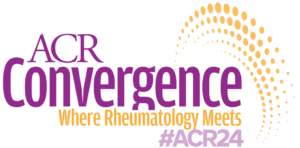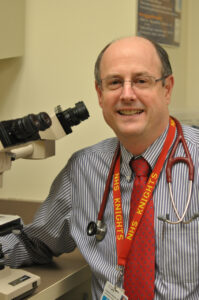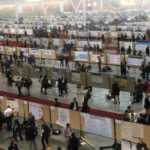 An engaging mix of new and returning programming is planned for ACR Convergence in Washington, D.C.
An engaging mix of new and returning programming is planned for ACR Convergence in Washington, D.C.
“ACR Convergence is unique because of the blend of high-quality science, updates on advances in clinical care and networking opportunities to advance the field of rheumatology,” says Annual Meeting Planning Committee (AMPC) Chair Gregory C. Gardner, MD, MACP. “We take the role of a scientific meeting seriously. It is a unique gathering of colleagues from all over the world to share science and inspire the next generation of clinicians and researchers.”
Registration for this year’s meeting, which will take place Nov. 14–19 at the Walter E. Washington Convention Center, is open, with two options for attendance, both of which include on-demand access to scientific session recordings through Oct. 31, 2025.
“Attendees should expect to have access to the latest advances in science that will impact our understanding of, and approach to, treating rheumatic diseases,” says Dr. Gardner. “The meeting should appeal to both researchers and clinicians whose career focus is on the broad category of rheumatic disease. This would include physicians, PhDs, ARNPs, PAs, OTs/PTs, social workers, etc. We are also interested in providing networking [opportunities] at ACR Convergence to foster collaboration and connection to accelerate the forward movement of the field of rheumatology.”
In addition to a full slate of activities in the Networking Lounges, two rooms will be dedicated to active learning sessions, in which audience participation will be integral to the learning experience.
“I am interested in bringing more opportunities for active learning to ACR Convergence, the type of learning that fosters attendee reflection and helps incorporate new ideas and concepts into the clinic and laboratory,” says Dr. Gardner, emeritus professor in the Division of Rheumatology at the University of Washington, Seattle.
To this end, faculty this year will have the unique opportunity to receive guidance on current principles of teaching and learning to foster active learning in a large group setting and have a medical educator review their presentations and provide feedback if desired. This important effort is being led by Kirsten Koons, MD, Jay Mehta, MD, MS, and Andrew Vreede, MD, members of the AMPC Quality Improvement in Learning and Teaching (QuILT) group.
“We anticipate that our effort to address teaching quality will make the sessions more impactful and improve information transfer at ACR Convergence,” says Dr. Gardner. “I am very appreciative of the efforts of our QuILT group.”
Meet the Professor sessions will return to the program by popular demand after an absence of several years. These interactive, small group sessions with leaders in the field of rheumatology require additional registration and a fee, and attendance is capped at 25 participants each. More than three dozen sessions are available Nov. 16–18.
The ACR Ultrasound Conference will also return for the first time since 2019. Each of the two options, the Basic/Intermediate Musculoskeletal Ultrasound Course and the Advanced Rheumatologic (Multisystem) Ultrasound Course, will be offered over two days, Nov. 14–15, in advance of the main conference. (Note: As this is being written, both classes are sold out.)
Meet the Editors events, starting at 8 a.m. EST on Nov. 18 in the Interprofessional Networking Lounge, will give attendees the opportunity to discuss the ins and outs of medical publishing with journal editors, including Daniel H. Solomon, MD, MPH, editor of Arthritis & Rheumatology; Josef S. Smolen, MD, editor of Annals of the Rheumatic Diseases; and Kelli D. Allen, PhD, editor of Arthritis Care & Research.
Guideline sessions featuring updates on evidence-based diagnostic and therapeutic approaches to rheumatic diseases, including lupus nephritis, also highlight the program, along with sessions on emerging technology shaping healthcare.
“Every year the theme is the latest advances in the science and practice of rheumatology, [and this year] we will have several sessions exploring artificial intelligence (AI) and its impact on our field,” says Dr. Gardner. “It is a hot topic beyond medicine, and I think there is still a lot of uncertainty regarding AI.”
AI-themed sessions include:
- Harnessing the Power of AI in Rheumatology Without Getting Burned, Nov. 16;
- ARP Distinguished Lecture: AI in Rheumatology Practice—Unpacking the Toolkit, Nov. 17;
- AI: The Next Breakthrough in Documentation for Rheumatology, Nov. 17; and
- Integrating AI into Rheumatology Education: A New Frontier for Trainees and Educators, Nov. 19.
As part of the advance offerings this year, the Basic and Clinical Research Conference on Nov. 15 will focus on the cardiometabolic aspects of rheumatic diseases. The Review Course, another high-interest session year after year, will showcase developments in calcinosis in connective tissue diseases, metabolic bone disease, sarcoidosis, rheumatoid arthritis, psoriatic arthritis, geriatric concerns, pain management, oral ulcers and more.
The Global Rheumatology Summit and FIT Program on Nov. 14 and the Radiology Bootcamp on Nov. 15 round out the advance programming.
Additional attendee favorites include:
- the Knowledge Bowl competition for rheumatology fellows, Nov. 16 and 17;
- the Thieves Market interactive case-solving sessions for pediatric and adult clinicians, Nov. 17 and 18, respectively; posters will be on display Nov. 16–18; and
- the Great Debates, Nov. 17; the pediatric-focused debate will address therapy for systemic juvenile idiopathic arthritis (sJIA) associated lung disease, and the adult-focused debate will discuss mixed connective tissue disease (MCTD); a new Workforce and Education debate, Nov. 16, will focus on whether the duration of rheumatology training should be competency based.
Some of the scientific sessions will incorporate interactive software to poll attendees and facilitate interaction between the faculty and audience.
“While this technology has been used at ACR Convergence in the past, we will be experimenting with new software this year and hope to use it more broadly in the future if all goes well,” Dr. Gardner says.
The educational experience extends beyond the scientific sessions. “The poster sessions are a must-attend activity overflowing with learning and networking,” Dr. Gardner says.
For more details on the scientific sessions and other activities at ACR Convergence 2024, view the Online Program or the Schedule at a Glance.
“I have been a rheumatologist for 35 years, and during my career, I have seen some profound changes in our understanding and treatment of rheumatic diseases. Many, if not all, of these amazing advances I first learned about at the ACR annual meeting, [which] we now call ACR Convergence,” says Dr. Gardner. “The pace of the advances is quickening due to the efforts of our researchers, and I am excited to learn about the breakthroughs that will impact my patients in the near future.”




